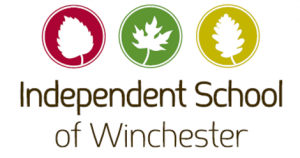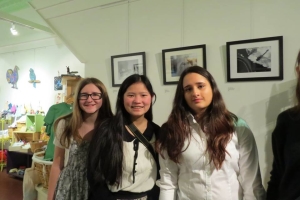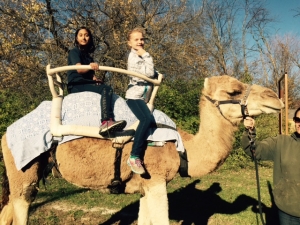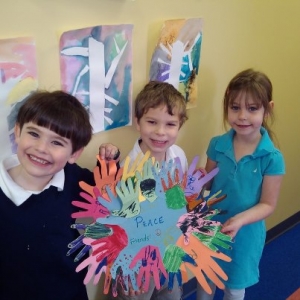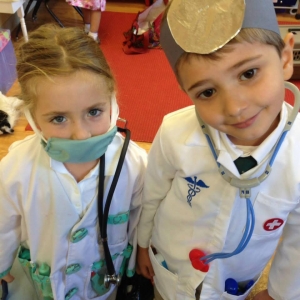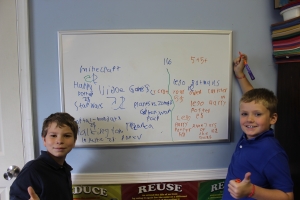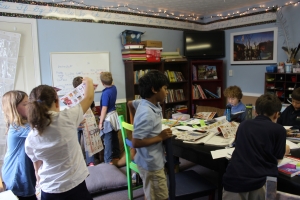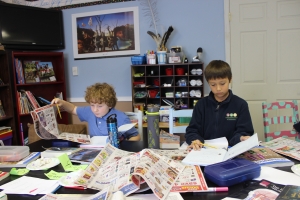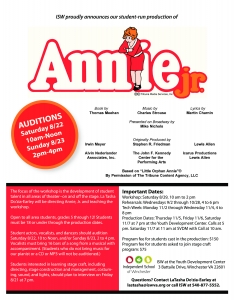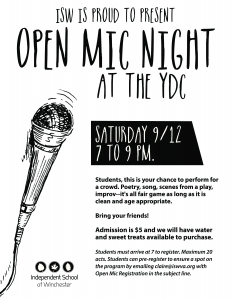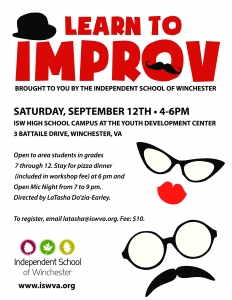Service Learning Comes Alive at ISW!
How can our school engage our students in discussion about what it means to live out ISW’s Core Values (respect, responsibility, empathy, integrity, and commitment to education)? That was the question that faculty considered last year. Affirming that our students should see themselves as leaders with the responsibility to make a positive impact on the community today (not some far-off time when our students are finally “grown up”), our faculty adopted an annual service theme that includes literature studies, field trips and speakers, and, of course, service projects. In other words, we adopted a true service-learning model.
Last spring, our students voted to make 2016-17 the year of Animal Welfare. And then the real fun began. Understanding that before students can help others, they must first educate themselves, teachers researched fiction and non-fiction, and we read (and read and read) many titles, including:
- The One and Only Ivan, by Katherine Applegate
- Hoot, by Carl Hiaasen
- Wesley the Owl, by Anna Sewell, adapted by June Brigman and Roy Richardson
- Dear Whiskers, by Ann Nagda
- Black Beauty, the graphic novel
- Iditarod-related books
Students wrote about animal welfare and debated it. One of our 4th graders wrote about a persuasive essay on the conditions in which hens are raised. A 3rd grader wrote a persuasive essay on testing human products on animals. A 9th grader created a photo essay about a cat colony in Front Royal. Kindergarteners spoke extensively during science units about treating all creatures with respect and kindness.
We hosted cross-divisional sessions:
- Upper Elementary students will visit the Middle/High School campus to share a morning of activities and to watch Hoot, the movie, over a potluck breakfast. (Incidentally, our Middles and High Schoolers volunteered to read Hoot, so they would be ready to discuss it!)
- High Schoolers visited the Uppers to teach sketching and some games in connection with Black Beauty.
- Uppers put together an Animal Lit unit to share with the Kindergarten and Lower Elementary students.
Our students enjoyed field trips and speakers, including:
- Blandy
- Blue Ridge Wildlife
- Dakota’s Dream
- Purposeful PAWS
- Timmy, a rescue dog
- Safe Approaches to Dogs
- Pollinator Release Program
- Camel Rides (which tied into the Middle School study of the Silk Route!)
And of course students created many service projects. A few highlights :
- Lowers made dog treats for the SPCA.
- Uppers decorated an origami animal-welfare-themed holiday tree for the YDC’s Festival of Trees.
- Middles created an owl-themed wreath for the YDC’s Festival of Trees.
- High Schoolers collected supplies and donations for Blue Ridge Wildlife.
- Art classes at all levels made nature drawings and animal portraits and collages.
- The High School photography class made education about animals at Esther Boyd and the SPCA a key subject for their photo exhibition at Tin Top.
We are loving this approach to service learning, and we judge it a huge success. Next year’s theme: Art in the Community. We can hardly wait!
Ten Questions to Ask about Your Child's Kindergarten
Kindergarten sets the foundation for the entire elementary experience—which in turn determines, for many, their high school and college experiences as well as their trajectory as adults. Choosing the right Kindergarten class is, therefore, incredibly important.
- Who will your child’s Kindergarten teacher be?
Your child’s first academic teacher should be warm, loving, positive, and capable—someone who helps your child (and you!) embrace the classroom as a second home. We recommend that Kindergarten teachers have at least 5 years teaching experience and/or a master’s degree. Ideally, teachers have a major other than education for their BA and a master’s in an education-related field.
- What are the goals and strategies of the class?
The best Kindergarten classrooms focus on the development of social and emotional skills necessary for lifelong learning--patience, self-control, focus on task at hand, ability to follow directions.
- How many students are in the classroom?
Class size is very important! Studies show that classes with fewer than 20 students yield significantly better outcomes than classes with 20-plus and that fewer than 10 students is ideal.
- How much time do students spend sitting?
Five-year-olds can focus for 15 to 20 minutes maximum. The best Kindergarten programs avoid asking children to sit for more than 20-30 minutes.
- How much recess time is there?
Kindergartners need two to three outdoor recesses—unstructured but supervised!--per day for many reasons. Physical exercise and fresh air dramatically improve brain function, and frequent breaks allow the consolidation of new lessons into long term memory. In other words, recess matters.
- How will my child’s reading level and skills be assessed and supported?
The best schools meet the individual needs of the children. If a child arrives in Kindergarten reading chapter books, the school should not require the child to sit through lessons learned long ago. However, it’s perfectly normal (and OK!) to arrive in Kindergarten not yet knowing how to read.
- Are there field trips and expert speakers?
As Benjamin Franklin said, “Tell me and I forget. Teach me and I remember. Involve me and I learn.” Trips and speakers create hands-on opportunities to bring learning to life and to expand your child’s world!
- How much of the curriculum is hands-on? How much time will my five year old spend in front of a screen?
As enticing as technology is and as important as it will be later in their lives, five and six year olds need to: work with all their senses, put their hands on as many lessons as possible, spend time outside, and build their knowledge through projects, art, song, drama, and play. There will be time later for screens. And the foundational skills learned in a solid Kindergarten class will serve students well when they are developmentally ready for technology.
- How does the school handle discipline issues?
The very best schools are small schools where every child is known and understood by many adults on campus. The focus should be on highlighting the positive and training students to consider their alternatives and make good choices.
- Do Kindergartners interact with older students?
Multi-age classrooms have long been wonderful places for children to interact with students of a wider range of ages. Children in multi-age settings have opportunities to lead, to follow, and to develop crucial social and emotional skills.
An Open Letter to ISW Parents
March 2016
Dear ISW Parents,
Ever wonder how ISW students stack up? Is an ISW education really something special?
This past weekend we sent five teams to the Regional Destination Imagination Tournament with wonderful results:
- All five teams placed in at least one challenge.
- Two teams qualified for the State Tournament
- One team placed third and was recognized in a field of 88 teams for outstanding teamwork.
- Two teams won their instant challenges.
ISW has been participating in DI for 6 years, and we have never walked away empty-handed. How can a tiny school with just 50 students, a school that sends all of our elementary students and most of our middle and high school students to competition, routinely beat schools of 500, schools that send only the best of the best?
An ISW education yields confident, creative, innovative thinkers and doers. We spend two hours a week on DI. We spend every hour building strong academic foundations, fostering the so-called “soft” skills like working on a team, and nurturing creativity and self-discipline.
When we send our students out into the world—whether it’s the regional science fair, art competitions, DI tournaments, performances, or national tests like the National Mythology Exam or the National Latin exam—they show us what a difference an ISW education has made in their lives. Worth. Every. Penny.
I guarantee you that the investment you are making in your children today will pay dividends tomorrow--in college and throughout their adult lives.
Best,
Claire
A vision for the future of Huzzah!
On Saturday, February 20, 2016, Huzzah, ISW's student-run production company, elected our first President, Rebecca Balcom. We share with you the speech she delivered. It outlines Becca's vision for our new organization and is an outstanding example of everything ISW believes about progressive education.
Fellow students and adults, I’m so glad to be able to share with you today my credentials and my vision for our Huzzah Theater Board. I am Becca Balcom, a junior in high school, and I would like to become president, but will very willingly play any role in this group. I’m a 17 year old who was lucky enough to find my passion for performing at the young age of three, so I’ve been able to gain a lot of experience since then. I have strong leadership skills, honed by my experience in assisting directors, working as a choreographer and teacher, and taking a very active role in my school’s student council. I have gratefully gleaned years of information and received so much from this wonderful community to eternally appreciate. It is time for me to stop looking into my past and turn towards the future, to giving back to a community, and a world, that has given so much to me.
My vision for Huzzah transcends just the group of us sitting here. I desire to begin the laying down of a legacy that will last for years to come, through various forms of outreach. There is the traditional community theater outreach we all know; I’d love to do as many plays and musicals as we can so everyone in our community can participate! In specific projects, I’m particularly interested in honoring our community with such productions as a musical review of Shenandoah, or something that relates to our history and local area.
Once we have these shows together, comes my next level of outreach. Rather than waiting for our audience to come to us, we could come to them! Utilizing our multitude of connections in the area and our skills of communication we could get venues to perform at like a performing theater troupe--whether the venue be a real theater or a school or an old folks’ home! Coming to those who may not be able to come to us will open their eyes to the world of theater and inspire them to become a part of it, perhaps even to become a part of Huzzah itself in the future. As we develop, we could potentially begin to host free or low cost classes in our areas of expertise to give the next generation of performers an extra boost!
My plan of outreach stretches to even another level, one that many of us here today are familiar with--social media. Huzzah Theater Board is one of, if not the only non-college student run theater companies. This makes us special- we are trendsetters, innovators. Through the use of Youtube and a website, we would be able reach out even further than our connections can go to enthrall and inspire even individuals we have never even met! This new form of communication to the world could be used to showcase each of our individual skills and talents--whether videos of original skits, performances of songs, or conversation-starting articles about individual passions. This would be a place that ensures that each and every one of us could shine.
Now I am aware that all of this is a large task to take on. The idea of putting on performances in not just one venue but throughout our area, teaching and inspiring young performers, and tackling the world of social media may seem daunting. But we are the leaders in all of this; we are the very first, and we need to make it count. I certainly do not expect all of this to happen at once or even while I am still a local member of Huzzah. But my desire, as I stated at the beginning of my speech, is to begin a legacy that lasts beyond me and that lasts in each and every one of you, and every one you know. For why should we be called “Huzzah!” if we are not something to be triumphant about? Together, I believe we can build a strong group, and a legacy that lasts a lifetime. I hope you will choose me wherever you think my ideas could be best put to use. Thank you.
Huzzah's membership includes 15 high school students from schools and homeschools all over the Northern Shenandoah Valley. They are planning three major community productions for the 2016-17 season. Stay tuned!
What is Progressive Education?
 Progressive schools are not all alike, but they can be characterized by their commitment to values such as these….
Progressive schools are not all alike, but they can be characterized by their commitment to values such as these….
As head of The Independent School of Winchester (Winchester, VA), one of the most frequent questions I get asked is, “What is an independent school?” When I explain that our school is centered on progressive education, parents invariably want to know what a progressive school is all about. Not all progressive schools are alike, but at The Independent School of Winchester (ISW), we believe in:
Internal motivation: People are born with the natural desire to learn. Babies learn to walk because they want to be mobile, to explore their world, to find out what’s “over there”—not because someone rewards them with a letter grade. Wise teachers cultivate the desire to learn with exciting and enticing experiences; students rise to the challenge because, years after they learned to walk, they still want to know what’s “over there.”
Individualized Pacing: Education should be tailored recognizing that each child learns at her own pace—because she will anyway.
Experiential Learning: To learn anything well, all senses must be engaged. Years of brain research verifies this, but it’s also common sense. No child should be glued to his seat. Recent trips and speakers include:
- Black Friars Theater in Staunton
- The Museum of the Shenandoah Valley
- The Polka Dot Pot
- The Islamic Center in Washington, DC
- The National Gallery of Art
- Claude Moore Farm
- Blue Ridge Wildlife Center
- Scott “Disaster Man” Shoup, from FEMA
- PurposeFULL Paws
At the high school level, students create Milestone Projects as sophomores and Capstone Projects as seniors. Both projects offer the opportunity to dive deeply into a subject of the student’s choice. Current projects include a documentary about the making of a high school musical and an online field guide to medicinal plants in the Winchester, VA area.
The Value of the Natural World: All human beings need time outside every day. Research is finally catching up with what our grandparents knew when they told our parents to “get out of the house and go outside!” Incredibly, visitors are routinely surprised to learn that even our oldest students spend at least 45 minutes a day outside.
The Multi-age Classroom: Most people won’t spend the rest of their lives isolated by the year of their birth yet most schools segregate by birth years. It’s easier to organize a school that way. It just is. Progressive educators believe that students need seasons of leadership as well as seasons of followership; the multi-age classroom is ripe with such opportunities.
The Value of Questions: We encourage our students to ask questions—challenging questions of themselves and of us. (Why do we do it this way? Why is it important to learn this? When will I ever use this again?) And we, as adults, continually ask ourselves whether we are following the best possible practices. (Is there new research we should examine? Is there a better way to teach material? ) If an approach isn’t working, a small, progressive school like ours can make immediate course adjustments.
There are days when this isn’t the easiest, most convenient way to run a school, but we didn’t get into this field because we thought excellence would be easy.
"When are we ever going to use this?"
At ISW, we love hands-on math projects because they provide an obvious answer to the question, “When are we ever going to use this?” Recently, Michelle Warner, one of ISW’s Upper Elementary math teachers, brought in ads from a local grocery store and gave her students $100 (fictional) money to spend. The results were fascinating and often hilarious:
- The Future Father: One student spent his money quickly and when Michelle asked him where $36 went, he replied, "I bought two boxes of diapers. I'm trying to plan ahead for the future when I have kids, because diapers are expensive!"
- The Master Chef-in-the-Making: Another student created a gourmet meal and would only purchase fresh foods, which required him to calculate the cost by weight.
- The Frugal Gals: Two young women combined their funds so that they could shop together. Their goal was to buy enough food to last an entire week.
- The Entrepreneur: A young man bought just a few basic essential items that were on sale. When asked what else he was going to purchase since he had so much extra money, he said, "Nothing. I am going to save it and use it to start my own business!"
- The (Self-Declared) Cheapskate: This young man carefully shopped to maximize his spending abilities. He eventually stopped and said he would finish his shopping at a dollar store.
- The True Team Players: Two other students put their money together and shopped as a team. They spent about $60.00 at the grocery store, noting that they were going to buy deodorant because, "We play sports after school and don't want to stink." They allocated their remaining money to video games and Harry Potter books. When they got down to $42.00 one suggested they save it, but the other responded, "Naaah, let's spend it!"
- Old-Fashioned Kids: And then there was the group that spent almost all their money on goldfish snacks and candy…
Great work, Ms. Michelle and your fabulous band of third and fourth graders!
Opening Day Remarks
9/1/2015
Welcome, welcome! Welcome back to our returning families! And a hearty welcome to our new families. Welcome back, teachers! And a special welcome to our new teacher, Michelle Warner.
While I don’t know what each of you students did with your summer, I can tell you that your teachers and our parent volunteers were busy! We adults spent the summer thinking about you and planning for your return. In this building, you will notice that Ms Laura’s room has a new, open concept layout. The restrooms and the lobby got a much-needed new coat of paint. And Ms Meghan has an office! Over at the YDC, we have a new lighting system in the theater, and we are in the process of renovating the booth in the theater. Ms Katie has moved into the blue room and is ready to tackle Middle School, and Ms Michelle has taken over Room 3 on this campus and can’t wait to get started with her Uppers!
The entire staff has been working on exciting new curriculum—choosing new books and working on field trips. We are especially excited to get started on the community service theme you students selected last spring: Animal Welfare.
Ms LaTasha and I spent much of the summer researching and planning to expand our performing arts program at the Middle and High School levels so that we can better serve both full and part-time students all over the Northern Shenandoah Valley. Middle and High Schoolers, you will no doubt be pleased to hear that, in addition to ISW’s production of Annie Jr, we also have an Improv Workshop planned for September 12 and an Open Mic Night the same evening.
Our Board has been working hard too. Our Building Fund Committee is looking at pathways to a new, more permanent home for ISW in the next couple of years.
And as we contemplate moving, it seems entirely appropriate for us to consider who we are as a school and as members of this region’s non-profit community…which brings me to our logo. And this is the “educational” part of my talk. I hope that all of you—students, teachers, parents, board members—are proud to call ISW your school home. And part of school pride requires an understanding of our logo, so here goes!
ISW chose leaves because we wanted our commitment to nature to be obvious. There are three leaves because we have three divisions—elementary, middle and high school. Our three leaves are from two hardwoods and one softer wood—oak, maple, and birch. Hardwoods are often best for building because, like ISW, they are durable, and they don’t dent easily. On the other hand, softer woods are more flexible and easier to shape. It seemed to us, when we designed the logo, that we wanted a little of both—strong core values mixed with flexibility.
On the far right we have the oak leaf. The ancient Celts saw the oak as a cosmic storehouse of wisdom—all the knowledge of the universe. Oak is associated with respect, responsibility, integrity, and commitment. Sound familiar? Interestingly, oaks also tend to attract lightening.
In the middle, we have the maple. The ancient Celts believed that maple trees are empathetic trees which mystically bring together all who gather under its branches.
And finally, on the far left we have the birch. According to ancient Celtic lore, birch is a pioneer tree—one which takes root and frequently revives landscapes where no other tree dares to grow. Birch is the symbol of growth, beginnings, and adaptability.
Truthfully, I am not a big believer in Ancient Celtic myths, but I do think it is inspiring to consider how the ancients thought about ISW’s symbols. As we start the year, I wish for ISW all the blessings of our logo: wisdom from the oak; friendship and love from the maple; and the pioneer spirit from the birch.
Kindergartners, Lowers, Uppers, Middles, and High School Students, thank you for your excitement, your inspiration and your trust. This school is, as always, our gift to one another. Welcome to the new school year.
ISW, a performing arts resource for all area students
ISW was founded in 2008 as a gift to the Winchester community, and we take that role very seriously. While all our programs, from Kindergarten through High School, are available on a full or part-time basis, today we are highlighting our performing arts programs, which are open to all students in the area. Our goal is to become an incubator for the performing arts in the Northern Shenandoah Valley.
- Last month, we hosted actress and master theater teacher Thomasin Savaiano, who conducted a two-week acting workshop. Young Actors Academy 2015 served more than 25 students--two thirds of the group from other schools.
- Annie, Jr. auditions are next weekend! We are thrilled that we have heard from students from many area middle and high schools who are planning to attend. We already have students assistant directing, running sound and lights, and developing/teaching choreography.
- ISW hosted three Open Mic Nights last school year with attendance reaching more than 50 students, the vast majority from other schools. We have another Open Mic Night planned for Saturday, September 12. This is an excellent opportunity for budding performing artists to try singing or doing stand-up or playing an instrument or tackling improv in front of a supportive group.
- ISW is hosting an Improv Workshop, led by our own La Tasha Do'zia-Earley, before Open Mic Night on September 12th. Again, it's open to interested students in the community!
Help us get the word out by sharing this post on social media. The more people who hear about the amazing options available at ISW, the better we are able to carry out our vision of serving the students of the Northern Shenandoah Valley!
Student-led conferences
At ISW, students lead their own end-of-year conferences. We love this practice for many reasons, not the least of which is that it allows us to live out many of our Core Values, including Respect, Responsibility, and Commitment to Education.
Beginning in Kindergarten, our teachers devote classroom time toward the end of the school year to sitting down with each child to take a look—one-on-one--at work completed. Our youngest students fill out teacher-created guide books that highlight their favorite activities (best field trip or Humanities topic or math accomplishment or song) as well as the elements that need more work (reading aloud, or listening, or memorizing math facts). Even our youngest students show surprising insights into their learning process. It is both heartwarming and tremendously encouraging to witness very young people lead their own conferences.
As students get older, they write considerably more in preparation for conferences, and the focus is on serious reflection. (When did I show grit? When should I have worked harder? What should be the focus of my summer work? What are strategies that have worked for me as I have tackled organization issues? What project did I rock? How did I balance the many demands of my schedule?) Students also put together portfolios of their work to share with parents. Adolescence is a period when students often experience the world as adult-dictated and themselves as powerless. The process of taking ownership through student conferences, however, is particularly empowering for Middle School and High School students. It suggests to them, rightly, that the adults in their lives respect them for the young adults they are becoming, that we trust them, and that they are well on the way to taking charge of their academic lives.
Assisting students in preparing for conferences is time-consuming; the fruits of that labor are well worth the effort.
Finishing Middle School with a Flourish
Each year in early June, we mark the achievement of completing Middle School with a student-selected, themed luncheon that includes student speakers, who regale us with stories about our 8th graders, a student-elected adult speaker, and a slideshow. We also present the newly-minted high schoolers with "Class of " tees. Congratulations, Class of 2019!

Ms. Claire welcomed the Middle Schoolers, their teachers, and their parents with the following.
Welcome to the Independent School of Winchester’s second annual luncheon honoring Middle Schoolers completing the 8th grade. Welcome, teachers—who have worked so hard to prepare our 8th graders for high school and for life! Welcome, 6th and 7th graders—in whose honor this event will be in just a year or two. Welcome to our rising 6th graders—who begin Middle School in the Fall—and to our high school students, who wanted to see their dear friends through this important milestone. And welcome especially to Mariana, to Katherine, and to their parents. We are here to honor you!
Our theme today is the book Little Women. Please enjoy the High Tea prepared by the Kornreiches and the Spargers. Many thanks to Lenore and Dee!
Hopefully most of you know that Little Women is a novel written by Louisa May Alcott in the late 1860s. It features the four March sisters and their parents facing a myriad of challenges during the American Civil War. My family had the good fortune to visit the home where Louisa May Alcott lived for many years. Much of Little Women was based on her own life experiences. We laughed when we discovered that her parents had started a progressive school in a barn in their front yard—a little close to home for us!
This 147 year old novel has much to teach us! It speaks to ambition, which abounds in both Mariana and Katherine: “Jo's ambition was to do something very splendid. What it was, she had no idea as yet, but left it for time to tell her, and meanwhile, found her greatest affliction in the fact that she couldn't read, run, and ride as much as she liked.”
Little Women also speaks to the challenge of getting one’s emotions in check—a skill that figures big in the transition from elementary school to high school. Jo March’s “quick temper, sharp tongue, and restless spirit were always getting her into scrapes, and her life was a series of ups and downs, which were both comic and pathetic.” One of the tricks to surviving the Middle School years is to figure out how to weather those ups and downs and how to hold one’s tongue, especially when addressing one’s parents.
Hopefully, now that Ms Diane, Ms Brigitte, Ms Christy, Ms Becky, Mr Jay, Ms LaTasha, and Ms Kerry are almost done with you, you also know that is important to, “Have regular hours for work and play; make each day both useful and pleasant, and prove that you understand the worth of time by employing it well. Then youth will bring few regrets, and life will become a beautiful success.” Translation: in the words of Ms Diane, “Get a planner and use it!”
Congratulations, 8th graders. I will close with Jo March’s thoughts: “I want to do something splendid...something heroic or wonderful that won't be forgotten after I'm dead. I don't know what, but I'm on the watch for it and mean to astonish you all someday.” At ISW, we are quite sure you will both astonish us one day. We are already so proud of you!
And now, in the words of Louisa May Alcott, “Let us be elegant or die.”
